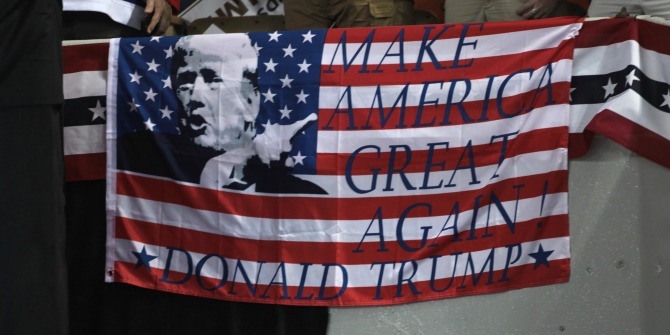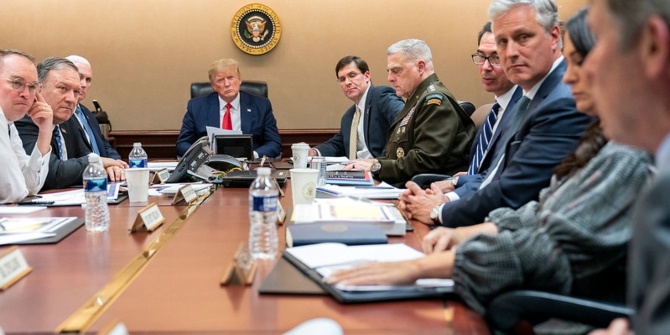An important but overlooked reason that the US struggles with the complexity of the contemporary strategic environment is that it continues to mistakenly employ outdated linguistic “frames.” Josh Kerbel explains how those frames—”post-Cold War” and the increasingly ubiquitous “new Cold War”—profoundly distort the US’ strategic perspective. He argues for “entanglement” as an alternative or replacement frame that will help the US better grasp today’s highly interconnected and interdependent world.
Ever since George Washington warned in his 1796 farewell address that the new nation should avoid becoming entangled in the affairs of foreign powers, the term “entanglement” has been a dirty word in US foreign policy discussions. Of course, in President Washington’s less connected world, avoidance was more of a choice. Today, the country has no choice. The world is unavoidably complex, and only by calling it what it is—entangled—will we be able to think about it realistically.
The importance of framing strategies
When the Cold War ended thirty-plus years ago the US coined no new moniker for the period that followed. We simply called it “post-Cold War” until that evolved into the more China-focused “new Cold War.” While the precise dates of the above descriptions may be debatable, one thing is certain: despite the emergence of a vastly different world over the last three decades, we never really changed our primary strategic frame.
Why does this matter? Fundamentally, it matters because language is powerfully connected to thought. But more precisely, it matters because metaphors, like Cold War, profoundly shape our perceptions of—and responses to—the issues they are used to characterize. Metaphors do this via a psychological phenomenon called the framing effect. The framing effect is a cognitive bias demonstrated when how something is said—framed—exerts a greater influence on one’s thought than merely what was said.
A wonderful example of the framing effect was demonstrated in a 2011 study by cognitive scientists Paul H. Thibodeau and Lera Boroditsky that showed the very different policy responses that study participants preferred when crime was characterized as a “beast” versus a “virus.” When discussed as a beast, study participants opted for aggressive and highly punitive actions. However, when characterized as a virus, participants opted for more preventative and reformative actions. Put differently, the frame played an outsized role in shaping perception of, and behavior towards, the issue.
China – connections not containment
Thus, by continuing to frame the contemporary strategic environment in Cold War terms, we falsely imply that today’s strategic challenges are like those of the Cold War. Such framing has reduced our current strategic conversation to being excessively about China just as our dialogue during the Cold War was dominated almost exclusively by the Soviet Union. Moreover, and perhaps worse, it has promoted the dubious notion that a highly militarized and economically divergent policy approach—reminiscent of Cold War era containment—will surely and directly result in our desired outcomes with China as well.

Photo by Kier in Sight Archives on Unsplash
This, of course, reflects a flawed understanding of the modern strategic environment. Today’s world is so interconnected that it’s neither possible nor wise to reduce it solely, or even mostly, to China (as the Middle East reminds us). In physical terms, modern transportation networks and technologies, aided by political conditions conducive to international movement, now make it possible for just about anything—from people to pathogens—to move from any one place on Earth to almost any other in mere hours. Not to mention today’s expansive virtual networks and technologies, which were barely imaginable during the Cold War.
And just as today’s interconnected world bears little resemblance to that of the Cold War, the challenges posed by China are unlike those posed by the Soviet Union. The Soviet Union’s challenge was rooted almost exclusively in its military power and its economy was comparatively small and effectively decoupled from much of the world. In contrast, China’s power is not only much more multidimensional, but it’s also deeply entwined with the broader global system.
A new framing – entanglement
Today’s highly complex global security environment can no more be reduced to China than China can be reduced to almost exclusively military terms. We need a mindset that defies the inclination to simplistically reduce. One that conversely promotes a holistic perspective and is sensitive to the extraordinary uncertainty and “messiness”—the trade-offs, second and third-order effects, and unintended consequences—that such complexity inevitably presents.
Which brings us back to the issue of our prevailing strategic frame. Cold War and its “post-Cold War” and “new Cold War” permutations are not just bad terms—they are actively problematic. So, what might be a better frame? What frame might better capture the interconnectedness—the “smallness”—of today’s world?
In quantum science, which is the very science of smallness, the term entanglement is used to describe a phenomenon whereby particles—even if separated by vast distances—remain connected. Or, put another way, entanglement occurs “when two or more objects are connected in such a way that they can be thought of as a single system, even if they are very far apart.” Entanglement seems to be a good metaphor for characterizing the unavoidable interconnectivity of the strategic environment described above.
Another thing that recommends entanglement is the fact that it’s an emergent phenomenon: a systemic property or behavior that “emerges” collectively from a complex network of interacting elements. After all, it is precisely such emergent phenomena—climate change; migration; urbanization, infosphere contamination, economic contagion, pandemic, etc.—that increasingly subsume and eclipse the more discrete actor-based threats that have traditionally dominated the national security threat spectrum.
All told then, let’s toss our Cold War metaphors and frames onto the same ash heap of history to which the Soviet Union was consigned and instead use entanglement as our preferred strategic frame. Entanglement provides a more accurate picture of the strategic environment that confronts us and, thus, it is more likely to prompt in our minds—via the framing effect—more realistic policy deliberations and choices.
We can call it the “Era of Entanglement.”
- Please read our comments policy before commenting.
- Note: This article gives the views of the author, and not the position of USAPP – American Politics and Policy, nor the London School of Economics.
- Shortened URL for this post: https://bit.ly/47BEGa1






